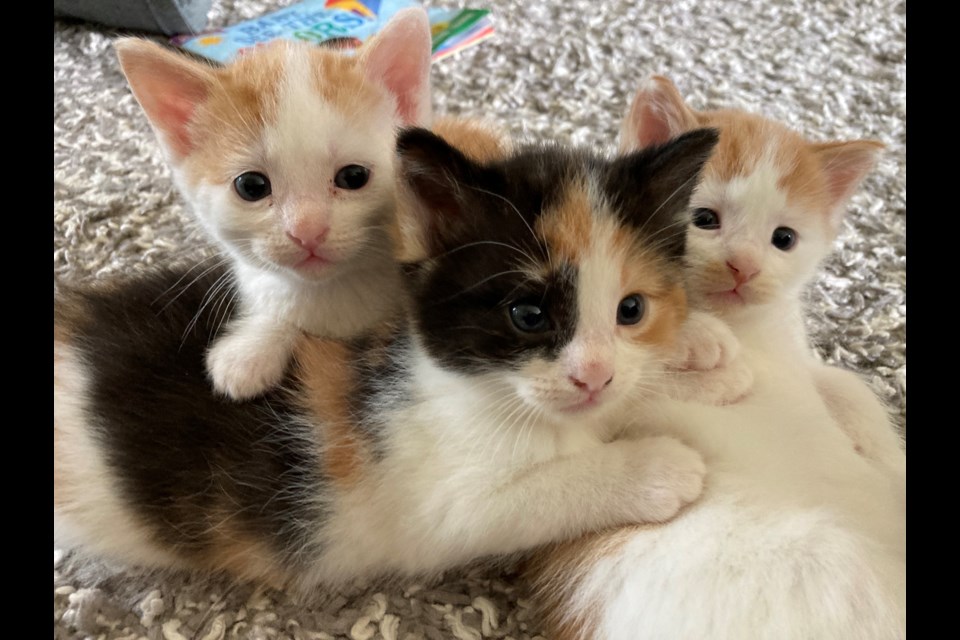ARTHUR ‒ A non-profit that focuses on rescuing cats and kittens across Wellington North and Centre Wellington is "overrun with kittens," and looking for more foster homes to support them.
Relying entirely on its network of foster homes, Arthur Animal Rescue Co-op (AARC) can “only ever take in as many cats as (they) have fosters.”
“It’s kitten season right now so there's no end to how many cats can come in, we could have five fosters or a million, they would always be full,” said Nicole Vettor, an adoption coordinator for the network. “But having more fosters gives us more opportunities to say yes when people come to us for help.”
There are currently 70 homes in the foster network with almost 120 cats spread out between them.
“We try to turn (the kittens) away to any other rescue we can but at the end of the day, they’re all just as full as we are,” said Vettor. “Some of us have ended up with cats in the bathroom, the basement – anywhere we can put them.”
Since their foster homes are at capacity, AARC has been forced to turn them away to other rescues in the hopes that they have space.
“I had somebody email today and say ‘We found orphaned kittens, can you take them?’ and I had to say no because we don’t have anywhere to put them,” said Vettor. “When everybody's full, the kittens end up with nowhere to go and that's not what any of us want to happen.”
Vettor started fostering last January after her two elderly cats passed away and she was looking for an option to bring up her kid’s spirits.
Since joining the group, Vettor has fostered almost 40 kittens: 22 in 2022 and 17 so far this year.
“The kids of course have asked to adopt every cat and every kitten that's come through the house,” said Vettor. “I always tell them every cat that we keep takes away one of our spots to foster so now they have a better grasp of that, it's like ‘oh, we can't keep them because we need to take in the next one.’”
A mother to three kids ages nine, six, and nine months, Vettor believes the experience has been “fantastic” for her children. During one “really nasty winter storm” Vettor and the kids took a cat in from the weather after seeing photos of it outside.
“As soon as the kitten was adopted, my daughter said ‘oh, so can another one come in from the storm now?’” said Vettor. “So they really get it, the idea that keeping the kittens moving is the most important thing that you can do.”
While “every cat stands out,” Vettor remembers three kittens from last year that came in “completely feral.” After AARC tried and failed to trap their mom, all three kittens were “super afraid” at the beginning of their seven-week stay; they were completely rehabilitated and adopted eight weeks later.
“It was such a huge difference from start to finish watching them go from these terrified shaking little kittens to these hilarious totally comfortable cats that would run around the house, attack your feet, and chase each other around,” said Vettor. “I think it was really cool for the kids to see that they went from such fearful places to just being normal happy cats.”
Started in 2015 by Audrey Peacock, who has been personally rescuing animals for over 20 years, the organization is currently focusing on making corporate agreements that will allow them to continue covering vet bills for their foster homes, in addition to purchasing food and cat litter when possible.
“No home is a bad home to foster. Most of the cats thrive in a lot of homes and really the more socialization they get, the better they are for adoption,” said Vettor. “In my house, we have the kids, we had dogs for a while- it’s a loud place at times but it's a great place for the kittens to learn to adapt to life.”
The average stay for a foster kitten is four to six weeks.
The most time-consuming foster type are bottle-fed kittens, who need their milk replacement every four hours but are “incredibly rewarding” to see thrive.
Isabel Buckmaster is the Local Journalism Initiative reporter for GuelphToday. LJI is a federally-funded program.



